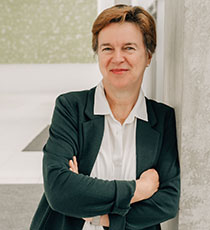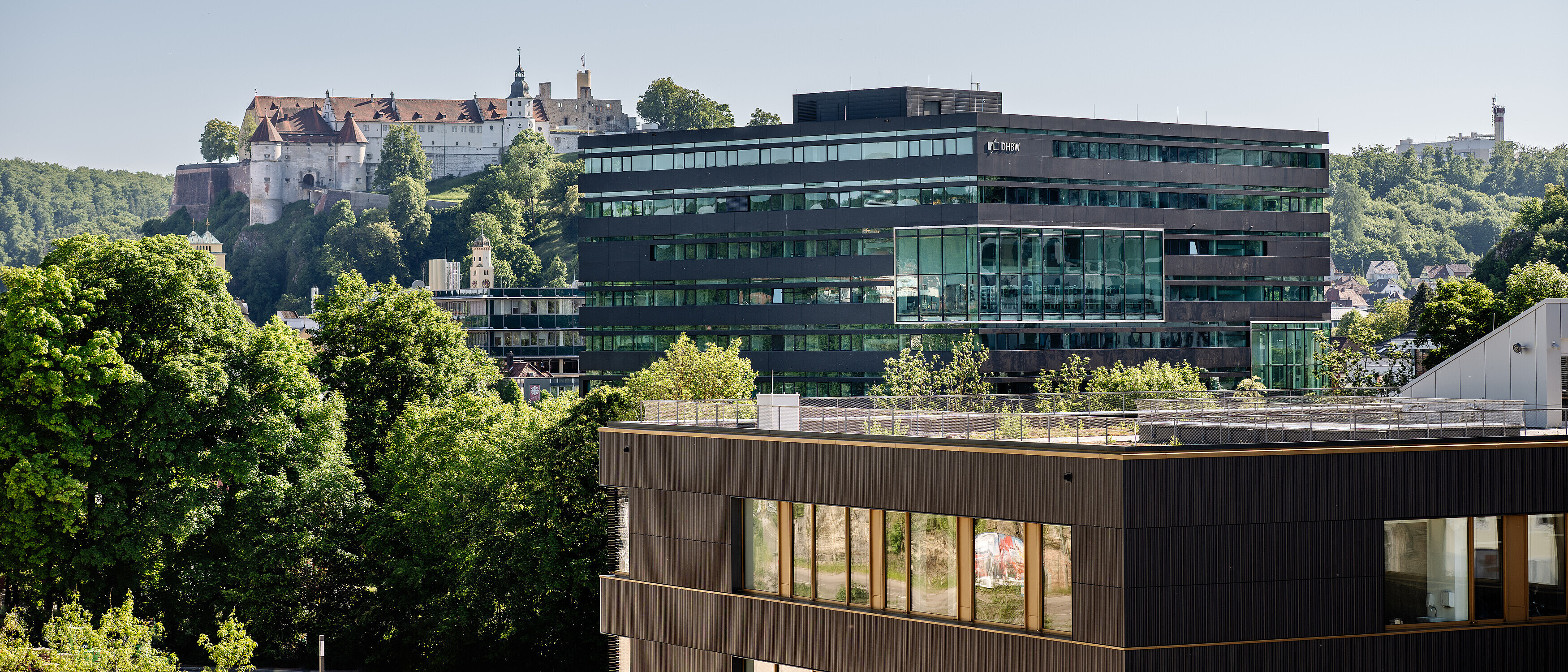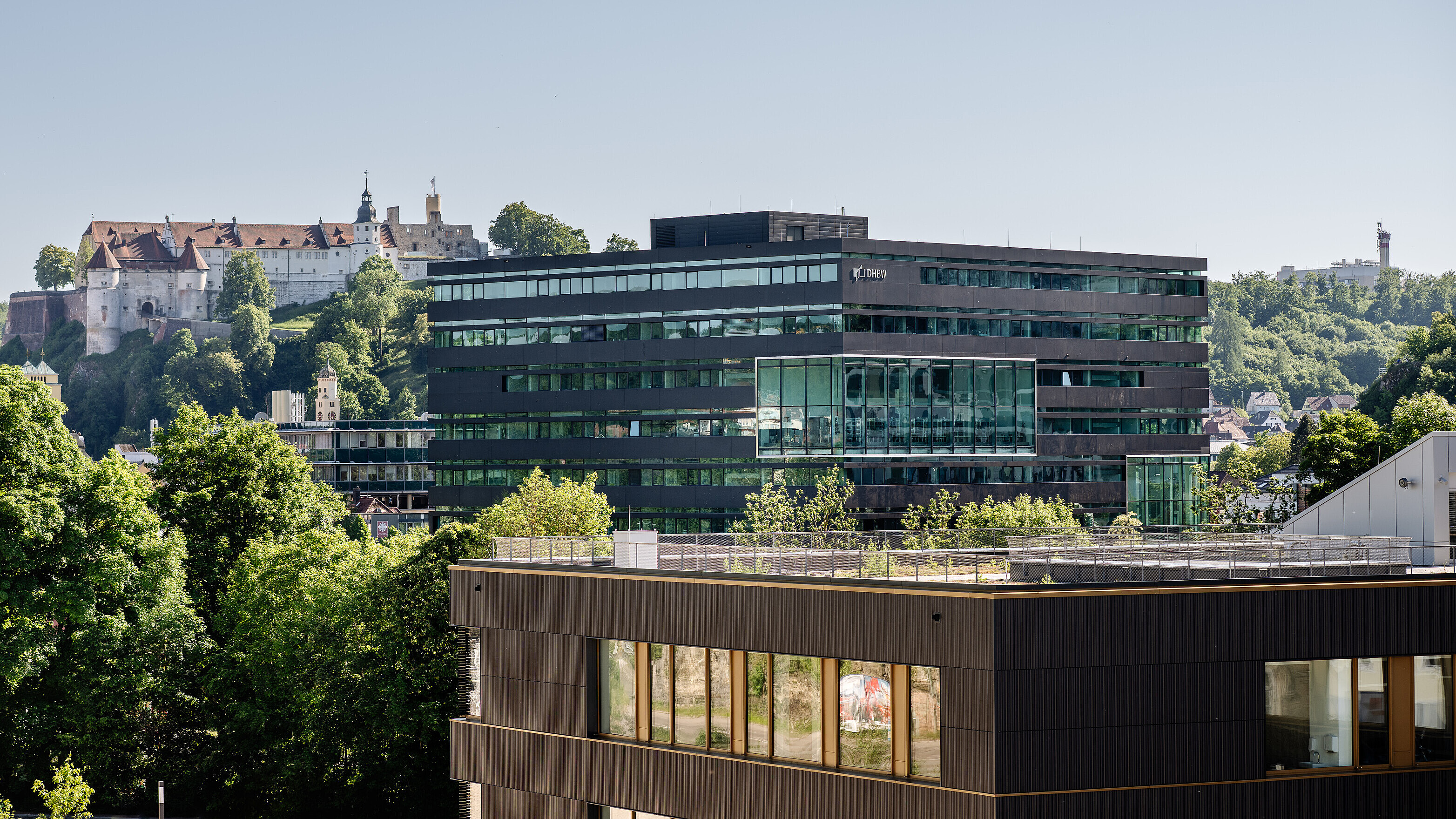About Us
The Dual system
Facts about Baden-Wuerttemberg Cooperative State University Heidenheim
Internationalization is one of the most important strategic goals of Baden-Wuerttemberg Cooperative State University Heidenheim.
Surveys showed that more than 40% of our students spend one semester abroad. This figure is well above average and the rate of outgoing students exceeds even those of big universities like Heidelberg or Tübingen. We have partner universities worldwide where students can either spend a semester abroad or do an internship in an international company.
In 1974, the University of Cooperative Education (now Baden-Wuerttemberg Cooperative State University) - in German "Berufsakademie" (now Duale Hochschule Baden-Württemberg) - was launched as an innovative new project in the Federal State of Baden-Wuerttemberg in the Southwest of Germany. It was designed to provide students with a post-secondary education based on the unique combination of theoretical studies and on-the-job training. UCE students alternate between academic and professional training, giving them the opportunity to immediately apply concepts learnt in the classroom to their workplace and in return bring new ideas from their training companies to the university.
Our connections are rather widespread as you can see on our network of partner universities.
The dual system of learning
The dual system of education, which provides a practice-oriented education involving both employers as well as state-run academic institutions, has a long tradition in Germany. "Duale Hochschule Baden-Wuerttemberg" - Baden-Wuerttemberg Cooperative State University - represents the extension of this dual system of learning into the field of higher education.
The University of Cooperative Education was established in 1974. It took only a few years for the institution to grow in size, complexity and importance. At present there are 9 campuses spread out over the Federal State of Baden-Württemberg with roughly 35.000 students and about 9,000 co-operating companies. The University of Cooperative Education expanded much faster than anticipated by the planners. The increasing number of students reflects the growing demand for junior staff with a practice-oriented educational background in business, industry and social institutions.
The typical employer will offer a traineeship to the student with the firm intention of ultimately taking the successful graduate into permanent employment. In fact, almost 85% of our graduates already have a work contract when they take their final exams.
Admission requirements
The following admission requirements apply to applicants with foreign academic credentials:
- The foreign school leaving certificate must correspond to the German university entrance qualification „Abitur“. You have to present your foreign educational qualification to DHBW’s central certificate recognition office in Stuttgart which will assess the equivalency .
- The „Regierungspräsidium Stuttgart“ is responsible for the assessment of foreign educational qualifications of German applicants as well as for applicants with double citizenship (applicants with German and foreign citizenship) who have acquired their educational qualifications abroad.
- The first language of instruction at DHBW Heidenheim is German. Foreign applicants must therefore prove their German language proficiency (e.g. Goethe certificate: C2, telc German: C1 Hochschule, etc.) in order to be admittted.
- For enrollment applicants must have a signed training contract with a workplace training provider „DHBW Dual Partner“.
Prospective students interested in studying at Baden-Württemberg Cooperative State University first need to apply for a traineeship at any of our partner companies or institutions. All information about the partner companies and the number of study places available at a given study programme can be found on the pages of the relevant programmes.
Overview Bachelor programmes (German)
Overview available traineeships at partner companies and institutions (German)
Location
The city of Heidenheim
Heidenheim is situated between Stuttgart and Munich, just north of Ulm and forms part of the "Schwäbische Alb" in the South of Germany.
History
The name "Heidenheim" was first mentioned in documents in the 8th century as a small village consisting mainly of farms. The city was founded in connection with the building of the castle at the beginning of the 12th century. It began as a castle settlement and was given ''market right'' in 1356. The castle itself was destroyed by a fire in 1530. It was rebuilt at the end of the 15th century and some ruins still remain today. In the so-called ''Knights' Hall'' there are music festivals and operas held every summer. Heidenheim's development as a city began in the early 19th century with the progression of the metalworking and textile industries. The most influential companies being J.M. Voith, Paul Hartmann and Carl Zeiss. Today, Heidenheim is the economic center of the region.
Weather
Heidenheim has a very moderate climate. The temperature is given in Celsius. In the winter months, the temperature is usually between -10° to +10°C, and in the summer it ranges between +20° to +30°C. Keep in mind that these temperatures are an average and you will find that most cities in Germany can have very different weather patterns during any of the seasons.
Transit Costs
Transit costs within Heidenheim and the surrounding areas are very reasonable. Buses and trains are frequently used modes of travel within and between cities; they are reliable and consist of an intricate network to bring you anywhere you wish to go. City bus tickets may be purchased from the bus driver. Train tickets may be purchased at the ticket counter in the train station (Bahnhof), or from the automatic ticket machines, but not on the trains. For longer trips you can get tickets from a travel agency (Reisebüro). Taxis are available, but tend to be expensive.
The Region
Heidenheim is very conveniently located in the middle of some of the most scenic places in Germany. It is near the border to Bavaria, with all its restored and well kept castles, and it is also near the Rhine river, where you can travel and see ruins of castles every few kilometers.
You can take the train to every city in the country, and it is very easy to make train trips to all cities in Europe. Within few hours you can be in Munich, Stuttgart, Nueremberg, Heidelberg, Karlsruhe, Tuebingen, Rothenburg ob der Tauber (only 100 km), Freiburg, and of course, the most famous castle of all - Neuschwanstein (the inspiration for the Walt Disney Castle). It is also possible to take the train or a coach to the capital city, Berlin, in approximately 7 hours.
Germany is bordered by nine countries: Denmark, the Netherlands, Belgium, France, Luxembourg, Austria, Switzerland, Czech Republic and Poland. All of these countries are worth a visit and very easy to get to from Heidenheim.
Living in Germany
Preparation
It is a good idea to learn as much as you can about Germany before you actually arrive, especially the differences in business practices, social norms, and laws that might affect your success. Even if you plan on going to Germany in a year, start preparing now!
Language
Language barriers are often very frustrating so, if possible, attempt to learn some German before you come to the country. Such as "Danke" (thank you), "Guten Morgen" (good morning), or "Sprechen Sie Englisch" (do you speak English?) are very useful. Wherever you go, people will always appreciate it if you show that you are trying to communicate in their language. Germans tend to be formal and reserved when conducting business and titles are very important. In German business situations, you should never use a person's first name until they offer. It is too easy for North Americans or other English-speakers to falsely assume that because a German-speaker is being friendly and congenial it is alright to become more familiar with them. Such premature familiarity makes many Germans uncomfortable, though they might not say so. It may be possible that people at your office will introduce themselves by their first names, but always wait until they directly offer before using it. Introducing yourself, either in person or over the phone, is always done by saying your first and last name.
Shaking Hands
When people meet or take their leave in Germany they usually shake hands briefly while maintaning eye contact. Shaking hands is part of the social behaviour and also a part of German business culture. It would be impolite not to do so. However, if you say hello to someone in passing it is not necessary to shake hands with them.
Punctuality
Germans place a lot of emphasis on punctuality. If punctuality is not an overly important factor in your own country, you should try to get used to it in Germany as soon as possible,if you do not want to cause a lot of annoyance. If you make an appointment you should arrive on time.
Meals
A classic German breakfast "Frühstück" is hearty and is comprised of bread or rolls, butter, cheese, cold meats, jam etc. Traditionally, the main hot meal in Germany is lunch (Mittagessen), eaten between 12 and 2 o'clock. Before eating, people wish each other "Guten Appetit" (enjoy your meal). The evening meal "Abendessen" is essentially composed of bread and butter with cold meats and cheese and is traditionally served at about 6 o'clock. Keep in mind these traditional habits are no longer observed by everyone. Many Germans eat different things for breakfast, or nothing at all, only have a snack at lunchtime, and eat a hot meal sometime in the evening.
During lunch or dinner time you will hear the words "Mahlzeit"or "Guten Appetit" which means "enjoy your meal". If you enter a table where people are already sitting and eating, it would be considered impolite if you do not say "Guten Appetit". The expression "Mahlzeit" is a proper way to address people at the company between 12:00 and 14:00, rather than saying hello.
Financial Considerations
Many students will be taking part in an internship (Praktikum) while staying in Germany. German companies will usually pay at the end of each month, so plan ahead to make sure that personal cash is available for the first weeks. If you are living with a host family then most services such as food, laundry, and some entertainment may be provided by them. However, if a host family is not available, you may have to rent an appartment. If this is the case, you are responsible for paying the rent, buying your own food, personal transportation, laundry and entertainment. Make sure that your personal funds are sufficient to cover these expenses.
Banking Services
Germany is one of the European countries that introduced the Euro in 2002. Currency can be exchanged at banks and small exchange offices. Banks are usually open between 8:30 and 16:30 and CLOSED on the weekend. Travellers checks (Reiseschecks) are cashed at banks (as long as you have your passport for ID), but never at "Sparkasse". ATM's are located at most banks, train stations (Bahnhof), and the post office (Deutsche Post ). If your bank card from home has a "MasterCard"or "VISA" logo it should be okay to use. If not, you may need to purchase an EC credit card, or an EC debit card at a bank after opening an account, which is free for students. It is advisable to open a bank account anyway while you are in Germany because most companies pay directly through the bank, not with cash or a cheque. EC credit cards work like other credit cards, while the EC debit cards work by putting money 'on' them, so each time the card is used the amount is automatically deducted until it is time to add more. Most businesses will accept the EC credit or debit card. Credit cards such as "MasterCards" or "VISA" cards are not accepted by all shops or restaurants.
Shopping Services
Most purchases are made with cash. Though many stores will accept EC, credit or debit cards, it is advisable to carry enough money for daily needs. Vegetable stores, fruit stores, bakeries and butcher shops are often separate. Opening hours are usually between 9:00 and 18:00, and most shops close around 16:00 on Saturdays. On Sundays all shops are closed. Most people carry a canvas bag (or a hand-basket) as most shops charge you for plastic or paper bags. Bargaining in shops is not usual.
Medical Information
Students enrolled at a German university must take out a German statutory health insurance. The International Office will advice you on this issue.
Pharmacies
In Germany, you can only get medicine at pharmacies (Apotheke). These should not be confused with drugstores (Drogerie) where, at the most, you can buy weak drugs like cough sirup, and mainly can find products such as shampoo, deodorant, shaving cream, razors, soap, toothpaste, body lotion etc. Some of these items might also be found at a grocery stores at a slightly higher price.
Transportation
Germany has a great network of trains, buses, subways and streetcars. Buses within the cities run frequently and are simple to use. Even small villages will have access to a bus that can take you to a train station connected to all the cities in Germany. It is even possible to take the train to almost any city in Europe.
Infrastructure
Some cities have an old town center (Altstadt) with castles and city walls. The buildings are often used as museums or government offices. Most cities have a marketplace (Marktplatz) where you can find the city hall (Rathaus) and the church (Kirche), as well as a variety of small shops. Usually pharmacies, bakeries, and grocery stores are located throughout the city along with many banks.
For your information: All electrical power points in Germany are designed for 220 volts, 50 Hz. AC and two-point plugs. Any adapters you may need can be bought in electrical shops.
Working in Germany
Working Hours
The average work week is 38 hours. Work starts between 7:00 and 9:00 and ends between 16:00 and 18:00 (including a 30 minute lunch break). Many large companies in Germany are adapting the Flextime method of scheduling where everyone will work an extra half-hour or so during the week and then take Friday afternoon off to start their weekend. Depending on the company you work for, you could also have a few paid holidays. Regular German employees receive about 27 days of holiday per year on top of many official holidays that have a religious or historical background.
Dress code
Depending on what company you are working for the dress code will vary, how ever, you should never go to work in jeans, t-shirts, or sneakers. Men working in a bank have to wear a suit and a tie and also women should always dress up in a conservative way. In other companies, men do not always have to wear suits, but at least a shirt and (probably) a tie and again - no jeans. On your first day at work you should wear nice and conservative clothes, and then find out how colleagues dress.
The "Kantine"
Larger companies in Germany have a cafeteria "Kantine". This is the cheapest way to get a complete meal for lunch. There are usually two or three different meals to choose from on certain days "Tagesgericht". Besides that, most places also offer salads, soups and snacks on every day of the week.
Contact
The international office of Baden-Wuerttemberg Cooperative State University Heidenheim is located in the main building at Marienstr. 20. Should you need any assistance, please do not hesitate to contact us.
For international students:
Marienstraße 20, Raum 719, 89518 Heidenheim
- Telefon
- +49.7321.2722.140
Marienstraße 20, Raum 720, 89518 Heidenheim

Marienstraße 20, Raum 719, 89518 Heidenheim
- Telefon
- +49.7321.2722.142

Marienstraße 20, Raum 719, 89518 Heidenheim

For Bridge Year:
Marienstraße 20, Raum 719, 89518 Heidenheim
- Telefon
- +49.7321.2722.145

Documents for international exchange students
General information
Instructions for Microsoft Teams
Information for international exchange students

